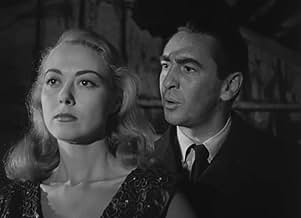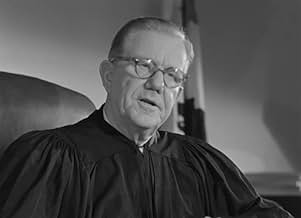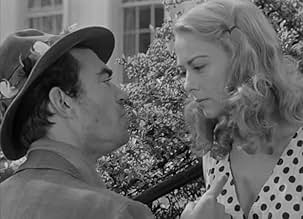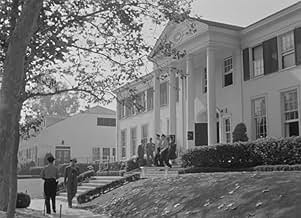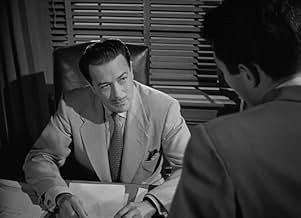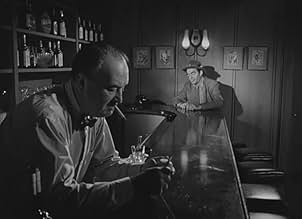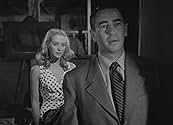VALUTAZIONE IMDb
6,2/10
920
LA TUA VALUTAZIONE
Aggiungi una trama nella tua linguaLawyer defends migrant worker falsely accused of two murders.Lawyer defends migrant worker falsely accused of two murders.Lawyer defends migrant worker falsely accused of two murders.
Frank Baker
- Court Stenographer
- (non citato nei titoli originali)
Marshall Bradford
- Coroner
- (non citato nei titoli originali)
Ralph Brooks
- Courtroom Photographer
- (non citato nei titoli originali)
Benny Burt
- Citizen
- (non citato nei titoli originali)
Jack Carr
- Angry Citizen
- (non citato nei titoli originali)
Robert Carson
- Jury Foreman
- (non citato nei titoli originali)
Ralph Dumke
- Bartender
- (non citato nei titoli originali)
Richard Emory
- Reporter
- (non citato nei titoli originali)
Recensioni in evidenza
A lawyer defends a migrant worker falsely accused of two murders.
What is interesting, first of all, is how the defendant is described as a "migrant worker". That is not incorrect, but I think perhaps the connotation in 1953 is different than in 2017, because now the term would almost exclusively be referring to a Latino employee. In fact, the United Nations defines a migrant worker as "a person who is engaged or has been engaged in a remunerated activity in a State of which he or she is not a national." This, more often than not, would be Mexican farmhands in the case of the United States.
Anyway, the film is quite good. I don't know if it was a feature or a B-movie, as it does give the impression of not having big names attached and perhaps a smaller budget. But for entertainment purposes and a but of suspense, it does the job. In retrospect, it also serves as a great example of early work from director Don Siegel.
What is interesting, first of all, is how the defendant is described as a "migrant worker". That is not incorrect, but I think perhaps the connotation in 1953 is different than in 2017, because now the term would almost exclusively be referring to a Latino employee. In fact, the United Nations defines a migrant worker as "a person who is engaged or has been engaged in a remunerated activity in a State of which he or she is not a national." This, more often than not, would be Mexican farmhands in the case of the United States.
Anyway, the film is quite good. I don't know if it was a feature or a B-movie, as it does give the impression of not having big names attached and perhaps a smaller budget. But for entertainment purposes and a but of suspense, it does the job. In retrospect, it also serves as a great example of early work from director Don Siegel.
Count the Hours (AKA: Every Minute Counts) is directed by Don Siegel and written by Karen DeWolf and Doane R. Hoag. It stars Macdonald Carey, Teresa Wright, John Craven, Jack Elam, Dolores Moran, Adele Mara and Edgar Barrier. Music is by Louis Forbes and cinematography by John Alton.
When a farmer and his housekeeper are murdered, suspicion falls on the hired hand George Braden (Craven). Owning a gun that matches the bullets used in the killings, Braden and his wife Ellen (Wright) are taken in for questioning when Ellen panics and is seen to throw the weapon into a lake. Under pressure and wanting to free his wife from duress, Braden confesses to the crime and finds himself on trial for his life. Enter Doug Maddison (Carey), a local lawyer who comes to believe that Braden is innocent and faces a fight against the clock to save Braden from the hangman's noose.
The pairing of Don Siegel and John Alton alerts the noir crowd to this compact low budget race against the clock thriller. In truth it's standard fare on a plot basis, with a mixed bag of acting performances (Elam and Wright exempt) and poor use of the Theramin in the musical score (it telegraphs what we should expect and feels on this occasion it's in the wrong movie), but within simplicity of story also comes potent points of worth.
As the clock ticks down and the stakes are raised, Siegel and the writers slot in the distasteful workings of the human being. Not only is there the running theme of the law quite frankly being an ass, but there is the bite of the rumour mill, a man forcing himself on to a desperate woman (Siegel zooms in for an emphasised facial shot that is bone chilling) and psychiatry playing a judicial hand; and not a good one at that!
Then there is Alton bringing his photographic tricks to compliment Siegel's efforts to lift a standard screenplay to greater things. Angular shots feature but it's with shadows and light that Alton excels, none more so than with the prison sequences. Here is where a frantic Braden is being held and it is a caged hell, because Alton highlights the shadows from the bars on the doors and windows as well, there is no escape from bars, they literally are all around, with one shot showing Alton at his best.
It's little seen and most likely forgotten about, and certainly its qualities have been ignored by the none film noir loving crowd, yet this is well worth a peek for those film lovers who like trawling the back alleyways for Siegel and Alton peccadilloes. 7.5/10
When a farmer and his housekeeper are murdered, suspicion falls on the hired hand George Braden (Craven). Owning a gun that matches the bullets used in the killings, Braden and his wife Ellen (Wright) are taken in for questioning when Ellen panics and is seen to throw the weapon into a lake. Under pressure and wanting to free his wife from duress, Braden confesses to the crime and finds himself on trial for his life. Enter Doug Maddison (Carey), a local lawyer who comes to believe that Braden is innocent and faces a fight against the clock to save Braden from the hangman's noose.
The pairing of Don Siegel and John Alton alerts the noir crowd to this compact low budget race against the clock thriller. In truth it's standard fare on a plot basis, with a mixed bag of acting performances (Elam and Wright exempt) and poor use of the Theramin in the musical score (it telegraphs what we should expect and feels on this occasion it's in the wrong movie), but within simplicity of story also comes potent points of worth.
As the clock ticks down and the stakes are raised, Siegel and the writers slot in the distasteful workings of the human being. Not only is there the running theme of the law quite frankly being an ass, but there is the bite of the rumour mill, a man forcing himself on to a desperate woman (Siegel zooms in for an emphasised facial shot that is bone chilling) and psychiatry playing a judicial hand; and not a good one at that!
Then there is Alton bringing his photographic tricks to compliment Siegel's efforts to lift a standard screenplay to greater things. Angular shots feature but it's with shadows and light that Alton excels, none more so than with the prison sequences. Here is where a frantic Braden is being held and it is a caged hell, because Alton highlights the shadows from the bars on the doors and windows as well, there is no escape from bars, they literally are all around, with one shot showing Alton at his best.
It's little seen and most likely forgotten about, and certainly its qualities have been ignored by the none film noir loving crowd, yet this is well worth a peek for those film lovers who like trawling the back alleyways for Siegel and Alton peccadilloes. 7.5/10
MacDonald Carey stars as a public defender taking on the case of a migrant farm worker accused of killing his employer in this unusual RKO production. Directed stylishly by Don Siegel and marvelously photographed by the great John Alton, whose penchant for deep, angular shots is on display throughout, Count the Hours has plenty of the ingredients you'd expect a noir classic to feature. Sadly, it's let down by a drab screenplay by Karen Dewolf and a dull, Lon Chaney Jr.-style performance by John Craven as the falsely accused handy man. The film also suffers from a Louis Forbes score that features an overdone theremin theme whenever the real villain appears on the screen. Count the Hours looks great and also features good performances by Teresa Wright (in a role that seems tailor made for Patricia Neal) and Jack Elam, but on balance, it remains a frustrating though watchable failure.
The great director who would make " invasion of the body snatchers" "the killers" "the beguiled" and even Elvis' best ("flaming star") is already present;his flair for film noir and for disturbing atmosphere is glaring in the scene in which the diver tries to rape T. Wright:the way Siegel films his eyes is absolutely terrifying ;ditto for the scenes when the lawyer looks for the former employee;oddly Siegel does not seem to very interested in T.Wright's character and the last scenes are given over to Dolores Moran and Adele Mara,who are relatively obscured thespians compared to the star of "shadow a doubt" and Wyler's war movies.
However,the movie is absorbing and a must for suspense buffs.
Like this ?try these
"phantom lady" (Robert Siodmak,1944)
"time without pity" (Joseph Losey ,1956)
"they won't forget " (Mervyn LeRoy,1937)
However,the movie is absorbing and a must for suspense buffs.
Like this ?try these
"phantom lady" (Robert Siodmak,1944)
"time without pity" (Joseph Losey ,1956)
"they won't forget " (Mervyn LeRoy,1937)
A robber breaks into a farm house. He is confronted by the owner and ends up killing the elderly couple. George Braden and his wife Ellen (Teresa Wright) are the neighbors. After some questionable responses, George is arrested for the murders. Doug Madison (Macdonald Carey) takes the case despite not believing in George's innocence.
At first, I thought some of this plot goes too far. I don't want to nitpick but I can't believe that they couldn't find the gun. Everybody knows where she threw it. It's not a raging river. Then I relaxed about it and realized that it's more about the acting style. The movie is doing that old melodramatic style. Teresa Wright is a great actress, but she's using her skills to do her utmost overwrought acting. I actually grew to like the plot especially if they could tweak some of it. I can see it be remade into something better.
At first, I thought some of this plot goes too far. I don't want to nitpick but I can't believe that they couldn't find the gun. Everybody knows where she threw it. It's not a raging river. Then I relaxed about it and realized that it's more about the acting style. The movie is doing that old melodramatic style. Teresa Wright is a great actress, but she's using her skills to do her utmost overwrought acting. I actually grew to like the plot especially if they could tweak some of it. I can see it be remade into something better.
Lo sapevi?
- QuizAfter Director of Photography John Alton agreed to shoot this movie, he asked Producer Benedict Bogeaus how much he had budgeted for rigging - the system of overhead pipes, brackets, ropes, and cables that suspend lights over a film set. Bogeaus told him four thousand dollars. "Give me two thousand dollars above my salary and I won't use any rigging," said Alton. He did it by using almost no overhead lighting at all, contributing to the film's rich visual atmosphere.
- BlooperThe screen shows a newspaper article stating that George Braden is about to go on trial for the murder of Fred Morgan. However, two people were killed, so both names should have been given.
- ConnessioniReferenced in Mau Mau Sex Sex (2001)
I più visti
Accedi per valutare e creare un elenco di titoli salvati per ottenere consigli personalizzati
Dettagli
- Data di uscita
- Paese di origine
- Lingua
- Celebre anche come
- Horas amargas
- Luoghi delle riprese
- Azienda produttrice
- Vedi altri crediti dell’azienda su IMDbPro
- Tempo di esecuzione1 ora 16 minuti
- Colore
- Proporzioni
- 1.37 : 1
Contribuisci a questa pagina
Suggerisci una modifica o aggiungi i contenuti mancanti

Divario superiore
By what name was Le ore sono contate (1953) officially released in India in English?
Rispondi
